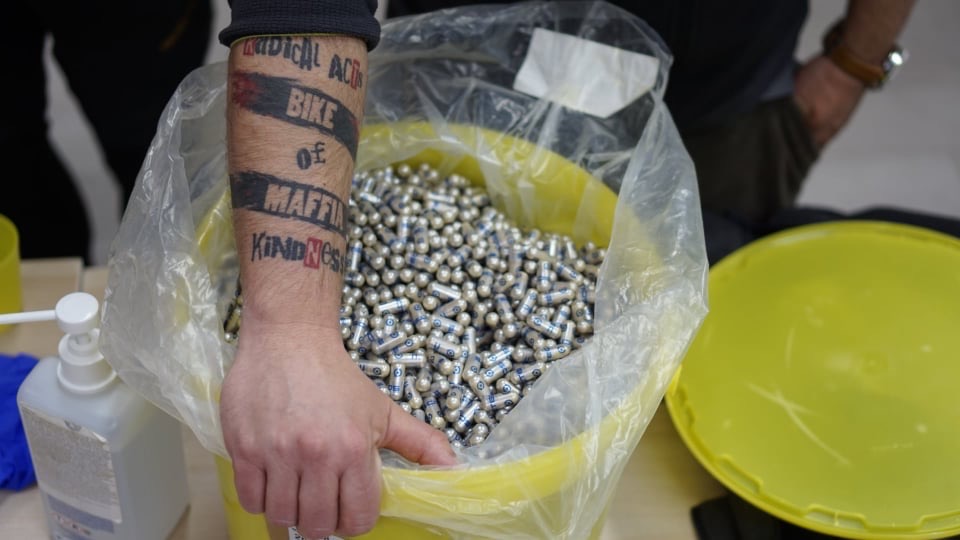The https://english.atlatszo.hu use cookies to track and profile customers such as action tags and pixel tracking on our website to assist our marketing. On our website we use technical, analytical, marketing and preference cookies. These are necessary for our site to work properly and to give us inforamation about how our site is used. See Cookies Policy
Homeless shelters face shortage of labour amid COVID-19 outbreak in Budapest
Homeless shelters in Budapest have introduced strict rules because of the current epidemic, but they are still at risk. While homeless people are losing their jobs, a shortage of social workers is making the operation of shelters difficult. We interviewed activists from two charity organisations, Menhely Alapítvány and Budapest Bike Maffia about the current situation.

Homeless people are very much at risk during the coronavirus epidemic, because many of them are older and already have health problems. While regular washing, social distancing and self-quarantine might protect most people from getting infected, the majority of homeless people are not in the position to practice these precautions.
Shelters and other institutions haven’t got enough staff and they are trying hard to keep their buildings infection-free. The inhabitants of the shelters are also suffering from losing their jobs.
Gergely Karácsony, Mayor of Budapest had earlier promised to create more places in such shelters and that they would prepare for a potential quarantine in these institutions .
„On the street, the most important precaution is to have as little physical contact as possible. In our field of work, this is extremely hard to carry out as social workers have to deal with many people.” – Zoltán Aknai, director of Menhely Alapítvány, a nonprofit organisation dedicated to helping homeless people, told Átlátszó.
He added that they try to reduce the risk by a number of measures such as visiting people who are not in critical need only once a week. March is always a difficult month, as the winter wears out homeless people physically and mentally as well – he explained.
In daytime shelters, a frequent washing of hands is compulsory and the disinfection of often used objects, such as tables and door handles is highly recommended.
To prevent a mass-infection, only 10 people are allowed to stay in the same room at one time. Aknai stressed that most of these institutions are not able to isolate areas within their building.
However, homeless people are aware of the risks, he said. Menhely Alapítvány is also printing posters to inform them.
Budapest Bike Maffia (BBM), a grassroots charity offering cooked food regularly to those in need has now suspended most of its activities due to the epidemic. At the same time they have launched a new campaign: the “VitaminBoom” collects and delivers various vitamin products to institutions caring for homeless and elderly people.
„We invite people to donate vitamins and money for homes for the elderly and for homeless shelters.” – Zoltán Havasi, founder of BBM told us. They originally planned to hand the vitamins out directly to people living in the streets, but in the current situation this would not be safe because of the risk of infection, so they give the donations to the institutions to distribute.
After the first week, they were able to deliver 6500 portions, but Havasi suspects that they will get tens of thousands more in the following weeks.
How sustainable is VitaminBoom? „We will continue as long as people care and have something to give.”
The situation at Menhely is not easy: many social workers have been exempted from work as they are above 60 years of age, or due to a health condition. Many of the younger workers have to stay at home to look after their kids because playschools and schools are closed now.
Aknai highlighted that looking after the homeless is not among the most popular jobs, so they face a constant labour shortage. Those working in social care jobs are earning less than 130.000 Forints (cca. 400 EUR) after tax.
Many of the temporary jobs and occasional work opportunities usually taken by homeless people or those living in shelters, are not available now, leaving these people in need without any income, in an even worse situation than before.
Some of these institutions have asked the public for help to be able to offer food to the families in their care. Fedél Nélkül (Without a Roof), a magazine otherwise sold by homeless people on the streets, is now instead offering an online version of the publication for a minimum of 500 forints, because the homeless vendors are not allowed now to sell the magazine.
Around the world, campaigns have begun to help the homeless during the coronavirus epidemic. Gavin Newsom, Mayor of San Francisco have reportedly promised to donate 150 million dollars for more shelters.
Written by Lili Rutai. You can read the more detailed Hungarian version of this article here.

Share:
Your support matters. Your donation helps us to uncover the truth.
- PayPal
- Bank transfer
- Patreon
- Benevity
Support our work with a PayPal donation to the Átlátszónet Foundation! Thank you.
Support our work by bank transfer to the account of the Átlátszónet Foundation. Please add in the comments: “Donation”
Beneficiary: Átlátszónet Alapítvány, bank name and address: Raiffeisen Bank, H-1054 Budapest, Akadémia utca 6.
EUR: IBAN HU36 1201 1265 0142 5189 0040 0002
USD: IBAN HU36 1201 1265 0142 5189 0050 0009
HUF: IBAN HU78 1201 1265 0142 5189 0030 0005
SWIFT: UBRTHUHB
Be a follower on Patreon
Support us on Benevity!
